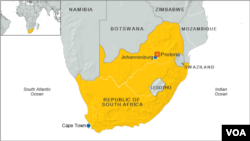Southern Africa often draws praise for its nations’ progressive constitutions, relatively mature democracies and advanced state of development compared to the rest of the continent.
Hidden in the background of that rosy picture, activists say, is a new and worrying trend: a “downward spiral” of human rights in the region.
Human Rights Watch is calling for Southern African Development Community leaders meeting in Botswana to do more to arrest this new trend, which has even affected South Africa, long thought of as a haven for rights on the continent.
Violence against immigrants
Dewa Mavhinga, a senior researcher at Human Rights Watch, said that has been seen in violence against African immigrants that critics say the South African government has not done enough to protect victims.
It has also been seen more recently in the government’s refusal to arrest Sudan’s president, who is wanted for genocide, during a June visit for an African Union summit.
South African officials said President Omar al-Bashir enjoyed diplomatic immunity from arrest as a summit attendee.
“South Africa is displaying very worrying trends in terms of tolerance for the rule of law and human rights respect,” Mavhinga told VOA News.
Most of the 15 countries in the continental bloc have progressive, rights respecting constitutions, he said.
The problem is that, increasingly, southern African leaders are borrowing tactics from their West and Central African colleagues, and either ignoring their own laws, or changing them to their benefit, Mavhinga said.
“There is a sense, I believe, that the authorities across southern Africa, there is this sense that human rights are not universal and there is some kind of exception they can be able to get away with by not respecting human rights, and this trend is getting more entrenched,” he said.
Rights-centered approach
The group is calling for leaders to commit to a more rights-centered approach.
Mavhinga noted Africa’s constant rhetorical tug-of-war between development and human rights, in which leaders often defend allegations of rights abuses by countering with tales of economic and social development.
In fact, Mavhinga said, this argument that development and human rights are competing forces is bad for development.
“It is not a valid argument, it is a false dichotomy,” he said.
“Development and human rights go hand in hand, and many leaders make the mistake of believing that these are mutually exclusive. If in fact, if you go with some of the leading economic and development thinkers, like (Indian economist) Amartya Sen, who speaks of development as freedom, what underpins genuine, long-lasting or sustainable development is respect for human rights," Mavhinga said.
"For example, access to information, civil and political rights, but which also guarantees that there is accountability and that there is transparency, which augurs well for development in a broader sense," he added.
He said African nations long ago committed to following international conventions on human rights, and are bound to obey them.
Angola example
Angolan activist Elias Isaac, who heads that nation’s branch of the Open Society Initiative for Southern Africa, agrees.
Angola is the third-largest economy in sub-Saharan Africa. It’s also one of the most unequal societies in the world, he said, adding that while Angola is an extreme example, it’s not an exception.
“It’s so difficult in Africa for you to pinpoint a good and a positive example of development that really produces social transformation whereby this development, you know, impacts the lives of the majority of the population,” he told VOA during a recent visit to Johannesburg.
“So in most countries in Africa, the experience is that development (doesn’t) accommodate a number of people," Isaac said.
The southern African leaders gathered for this week’s summit will be focusing on a theme of accelerating industrialization. But rights defenders say such an agenda means little without human rights.




